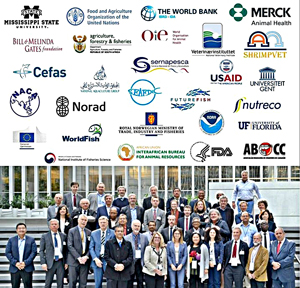[ad_1]
Table of materials
 |
FAO, the Mississippi State University (MSU) and the World Bank (WB) convened, a multistakeholder consultation (10-12 April 2018, Washington DC) participated by some 45 delegates from governments, industry and academe, and discussed a progressive management pathway (PMP), a potential tool to put appropriate and sustainable levels of risk management in aquaculture production systems. The sheer numbers of cultured species (more than 500 species), stakeholders and enterprises in the supply/value chain, the diversity of aquaculture containment, systems, environments, size of farming operation and management, the pathogens/disease themselves (single, multi-infection, syndromes, cryptic), the emergence and rapid spread of infections, the multiplicity of spread pathways, all combine to present an enormous challenge for management, at all levels.
Árni Mathiesen, Assistant Director General of the Fisheries and Aquaculture Department, noted the global aquaculture situation in 2016 – that produced 80 million tonnes of food fish valued at US$231.6 billion. Production and revenue losses caused by diseases are detrimental to the sustainability of the industry and its future, especially because the large majority of aquaculture production still comes from rural smallholders with little or weak capacity to respond to disease outbreaks. MSU’s Associate Dean Mark Lawrence hoped that this initiative can help address worldwide problems in this area that will help all stakeholders to make positive progress. Vincent Xavier, Lead Fisheries Specialist, WB, said that this consultation aligns very well with WB’s mandate to eliminate world poverty and the Blue Economy. He informed of WB’s reinforcing investment in the fisheries and aquaculture sector and believed on the importance to learn from collective disease experience.
The PMP for Aquaculture Biosecurity (PMP-AB), an extension of the “Progressive Control Pathways” (PCP), used for controlling major livestock and zoonotic diseases, focuses on building management capacity through a combined bottom-up/top-down approaches with strong stakeholder engagement to promote application of risk management at producer level as part of the national approach. The PMP-AB consists of 4 Stages which lead to a sustainable and resilient national aquaculture system. Moving from one stage to another should meet a set of minimum entry requirements and a detailed plan for implementation in the following stage must be prepared. ‘Gateway passes’ are usually in the form of Biosecurity Action Plan.
The consensus reached was that the PMP-AB is a useful tool. Refinement and implementation should actively engage governance authorities and industry stakeholders to ensure buy-in, best-fit for country, but a template that provides a degree of consistency between participating countries or regions. Further work includes: further development of the technical aspects of the PMP-AB, wider consensus building, initial application, and resource mobilization. A second follow-up consultation is planned.
In his closing remarks, Vimlendra Sharan, Director of FAOLOW thanked all the participants and partners for this timely endeavour and noted that the uncertainties identified will help further shape the PMP and as with any new tool, guidance documents and resources for advocacy and training will be needed that will facilitate adoption at the national level.
[ad_2]
Source link





